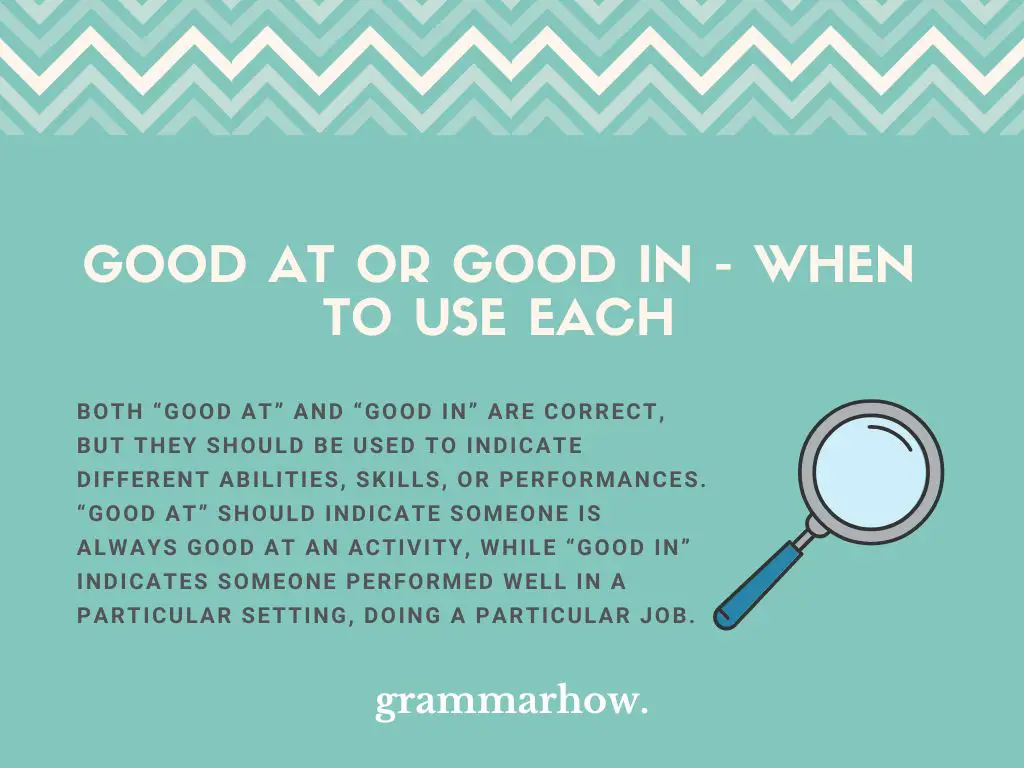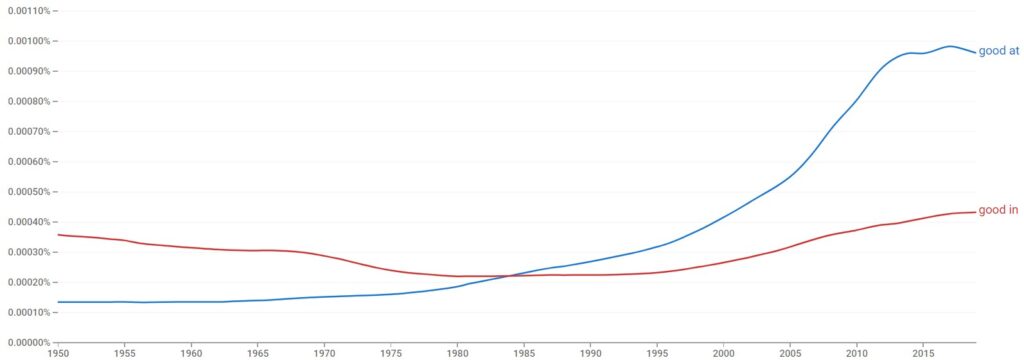When expressing that someone did well performing a certain activity, should we say they were “Good At” or “Good In”?
We want to know if both forms are acceptable, or if one should be avoided. We also want to know when to use them, to make sure we sound correct.
Good at or Good in – When to Use Each
Both “Good At” and “Good In” are correct, but they should be used to indicate different abilities, skills, or performances. “Good At” should indicate someone is always good at an activity, while “Good In” indicates someone performed well in a particular setting, doing a particular job.

Let’s take a look at some examples:
- Geena is good at playing guitar.
- Geena is so good in the album the band just released.
- Jake is good at math.
- Jake’s SAT score is quite good in math, but not so good in reading.
Prepositions can make a big difference in the message a sentence conveys. It’s such a small word, that has such a big impact. That’s what we see happening with “Good At” and “Good In”.
In the first set of examples, Geena is a good guitar player. To say “Geena is good at playing” means that at any day, any time, Geena can play guitar well. She’s “Good At” it because she masters this skill.
In the second sentence, we specifically comment on Geena’s job on a particular album – not her ability in general, but her performance in this specific setting. In this scenario, we say “Geena is good in the album”, meaning that she was particularly “Good In” this performance.
Good at
“Good At” is a grammatically correct phrase, that should be used to indicate someone is “Good At” a particular skill or activity. To be “Good At” means to be good in general, not only in a particular setting, performance, or opportunity – it means the subject masters that skill or ability.
Let’s take a look at some examples:
- Bea’s good at English grammar, and you should ask for her help.
- I’m good at mathematics, but not so good at geography.
- Joe’s very good at cooking.
- Luana’s good at sports, she does well in anything she tries.
- Linda’s good at fooling people. You should be careful.
- Gabriel is so good at drawing, that I think he might make it a career.
Always use “Good At” when describing what someone is trained to do, or is capable of doing, in general. If you wish to describe a particular task or event, you should use “Good In”.
Good in
“Good In” is grammatically correct and should be used to indicate that someone did a particular job well. It doesn’t mean they’re always “Good At” it or that they master the skill, but they’ve done well in a particular setting or opportunity.
- Paul and Phillip’s performance is good in dancing rehearsals.
- Can you please make an effort to be good in history class?
- Is Hannah doing good in her studies?
- Our team was good in managing the conflict at the store yesterday.
- The photography was so good in this movie.
- It’s not that Peter isn’t doing good in this task. We just think he could improve.
Which Is Used the Most?
Which one of those forms is used more often, “Good At” or “Good In”? We’re curious to find out, so we’ll take a look at the graph from Google Ngram Viewer below.

“Good At” seems to be the most common form, appearing on the graph as being used more frequently than “Good In”. We think it makes sense, because “Good At” seems to be more present in people’s vocabulary.
However, it’s interesting to notice that until the late 1980s, “Good In” was used more often, and at some point the phrases swapped positions. We wonder what provoked this change, decades ago.
Final Thoughts
You can use both “Good At” and “Good In”, as long as you understand they have different applications. Use “Good At” when someone masters a skill or an ability, meaning that they are always “Good At” is. Use “Good In” when someone performs well in a particular job or activity.

Martin holds a Master’s degree in Finance and International Business. He has six years of experience in professional communication with clients, executives, and colleagues. Furthermore, he has teaching experience from Aarhus University. Martin has been featured as an expert in communication and teaching on Forbes and Shopify. Read more about Martin here.

